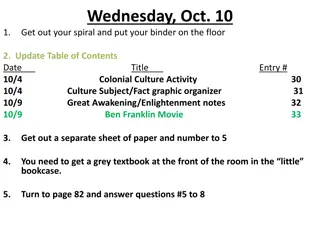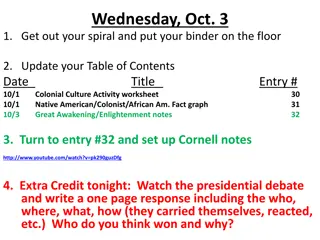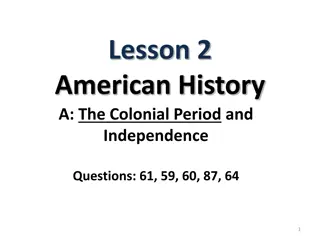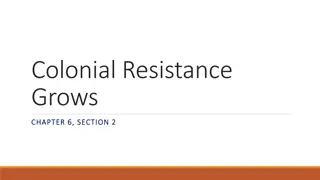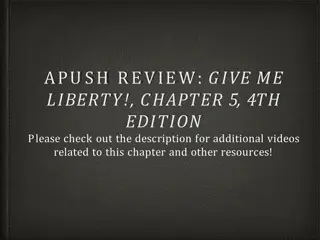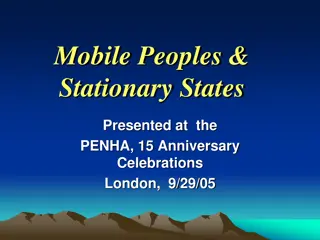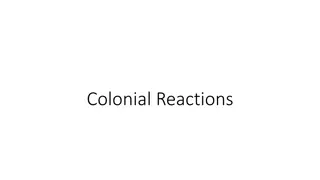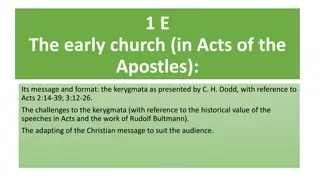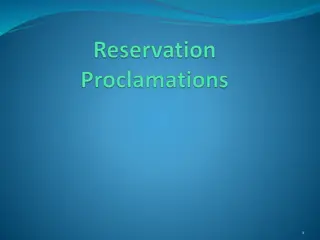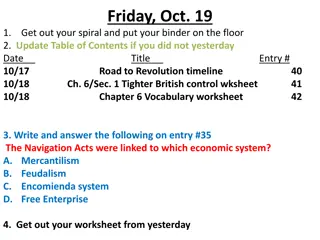Understanding Colonial Acts and Proclamations in Early America
Explore the series of acts and proclamations that shaped the relationship between colonists and the British Empire in early America. Learn about significant events such as the Proclamation of 1763, Navigation Acts, Sugar Act, Quartering Act, and Stamp Act, and understand why these measures sparked anger among the colonists. Discover the key figures and reasons behind this important period in history.
Download Presentation

Please find below an Image/Link to download the presentation.
The content on the website is provided AS IS for your information and personal use only. It may not be sold, licensed, or shared on other websites without obtaining consent from the author. Download presentation by click this link. If you encounter any issues during the download, it is possible that the publisher has removed the file from their server.
E N D
Presentation Transcript
Test Grades posted Today you need: Spiral Pen/Pencil Absent yesterday? Need to take test see whiteboard Pick up Acts Chart from front table Tape your chart in your spiral leaving the top white space blank
To keep peace with Natives Colonists can t move past Appalachian Mountains. Proclamation of 1763 issued 1763 Proclamation leads to anger Why would this Proclamation lead to anger? Who issued the Proclamation? https://www.youtube.com/watch?v=HKNTBHmW OyA
Navigation Acts Colonists could only trade with Britain (mercantilism) 1650s- 1750s Navigation Acts Smuggling to avoid paying the taxes The Colonies exist to benefit the Mother Country
Taxed sugar and molasses 1764 Sugar Act Anger, protests - Taxation w/o representation Why would the Sugar Act cause anger? What was Taxation without Representation? Colonists considered this Act tyranny Unjust use of power https://www.youtube.com/watch?annotatio n_id=annotation_3717240465&feature=iv& src_vid=Wj58G0iCoac&v=kxdHoyHpVRI
Quartering Act To Quarter = to house
Colonists required to house and supply British soldiers 1765 Quartering Act Anger Why would this cause anger among the colonists?
1765 Stamp Act passed (repealed 1766) Taxed all legal documents such as diplomas, contracts and wills Documents had to carry a stamp showing that the tax had been paid Boycott of British goods; Protests, Burning effigies
Sam Adams Adams was a driving force behind the protests. He was a member of the Sons of Liberty who started the Committee of Correspondence to stir public support for American independence.
LAWYER REBEL
Declared Parliaments supreme authority to govern/tax the colonies 1766 Declaratory Act passed Power struggle with Parliament
1767 Townshend Acts passed (repealed 1770) Taxed glass, paint, paper, tea and lead. New boycotts; Natural Rights (John Locke) threatened
Protests immediately broke out at news of the Townshend Acts Went against natural rights (JOHN LOCKE) No one ought to harm another in his life, health, liberty or possessions
Boston Massacre - 1770 Deadly riot caused the death of 5 colonists. Paul Revere creates an engraving as anti- British propaganda 1770 Anger spreads throughout the colonies through newspapers Boston Massacre
Tax on tea 1773 Tea Act passed Boston Tea Party, Anger
1774 Intolerable Acts (Coercive Acts) passed 1. Closed the Port of Boston until the colonists paid for the destroyed tea 2. Placed the government of Massachusetts under British control 3. British soldiers accused of murder would stand trial in Britain, not the colonies 4. Sent even more British troops to enforce the new law First Continental Congress bans trade; militias organized










